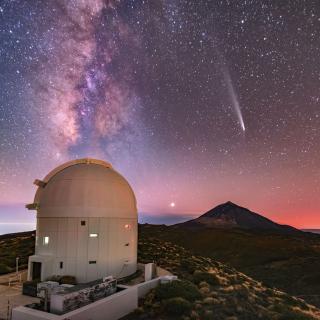It may interest you
-
 Cristina Ramos Almeida, investigadora del Instituto Astrofísico de Canarias (IAC) y coautora de más de un centenar de artículos sobre galaxias y agujeros negros, ha sido una de las homenajeadas en la primera edición de los premios "Mujeres tenían que SER" de Radio Club Tenerife, Cadena SER. El evento, celebrado en la noche del miércoles 29 de octubre, en la sala Adán Martín del edificio de Presidencia del Gobierno en Santa Cruz de Tenerife, ha teñido el espacio de reconocimiento al talento femenino en diversos ámbitos. La distinción resalta la crucial contribución de Ramos Almeida a laAdvertised on
Cristina Ramos Almeida, investigadora del Instituto Astrofísico de Canarias (IAC) y coautora de más de un centenar de artículos sobre galaxias y agujeros negros, ha sido una de las homenajeadas en la primera edición de los premios "Mujeres tenían que SER" de Radio Club Tenerife, Cadena SER. El evento, celebrado en la noche del miércoles 29 de octubre, en la sala Adán Martín del edificio de Presidencia del Gobierno en Santa Cruz de Tenerife, ha teñido el espacio de reconocimiento al talento femenino en diversos ámbitos. La distinción resalta la crucial contribución de Ramos Almeida a laAdvertised on -
 En 2025, el Instituto de Astrofísica de Canarias (IAC) celebra el cuarenta aniversario de su inauguración oficial en 1985, consolidándose como uno de los principales centros de investigación de Astrofísica a nivel internacional.Advertised on
En 2025, el Instituto de Astrofísica de Canarias (IAC) celebra el cuarenta aniversario de su inauguración oficial en 1985, consolidándose como uno de los principales centros de investigación de Astrofísica a nivel internacional.Advertised on -
 The European Solar Telescope (EST) project has taken a decisive step towards construction with the establishment of the Board of Governmental Representatives (BGR), marking the first formal commitment at the governmental level to this European flagship in solar research. Until now, EST has been driven by a scientific consortium of universities and research institutions across Europe. The creation of the BGR transforms EST into a collaboration among European nations, whose national governments lend political support to the project and to the creation of a future European Solar TelescopeAdvertised on
The European Solar Telescope (EST) project has taken a decisive step towards construction with the establishment of the Board of Governmental Representatives (BGR), marking the first formal commitment at the governmental level to this European flagship in solar research. Until now, EST has been driven by a scientific consortium of universities and research institutions across Europe. The creation of the BGR transforms EST into a collaboration among European nations, whose national governments lend political support to the project and to the creation of a future European Solar TelescopeAdvertised on
